
1857 General Election: The Campaigns
The Press
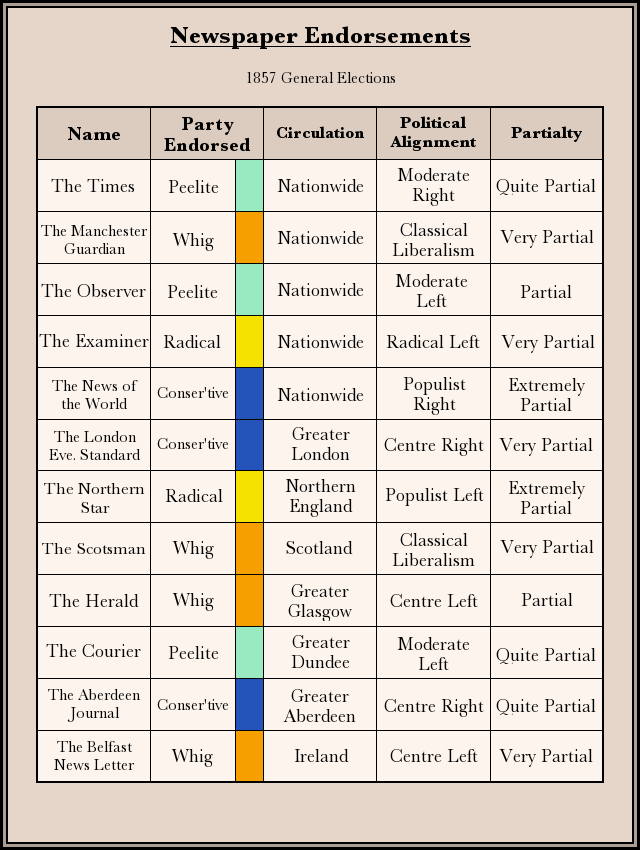
For the most part, resolute editorials remained aloof of any shifts in the views of the populace and continued to espouse lines that had survived since the antebellum. Certainly, Palmerston and his Whigs were favoured well by an innately liberal press, with Derby continuing to be forced to survive on the support of the tabloid and nationalistic press – though it should be noted that, in any case, the readers of such papers were more often than not unlikely to have the vote. Indeed, the true effects of journalistic support on the outcome of elections in the mid-Victorian period is debatable. Ultimately, however, it is more than likely that the entrenched nature of the main parties' respective support bases was not conducive to great change brought on by any number of editorials and article in favour of any particular party. Therefore, as ever, where loyalties were not so firmly rooted, contests would be decided at the hustings rather than in the breakfast room.
The Hustings
There not having been an election since that of 1851, the interval between contests had led some to hazard that a changing of the political landscape may have occurred, and that the Conservatives were well-positioned to offer a surprise challenge to Palmerston's iron-like grip over the country's affections. Such predictions were undoubtedly bold, with the prime minister and his party showing no signs of having lost the support of the people after their successful conclusion of the Masovian War, though that is not to say that they held no semblance of truth whatsoever. Certainly, one can point to growing discontent with the management of the war and subsequent events amongst certain elements of the government as evidence of a decline in Palmerston's popularity. Although largely still loyal to the premier, the Peelites did not view Disraeli's challenge upon the government with complete distaste, and many wondered if the group would continue to give their support to any Whiggish-dominated ministry formed in the election's aftermath. Therefore, the election was of heightened interest to these keen to see whether Palmerston would be able to command a sufficient majority to govern alone, repeating Lansdowne's feat of 1851, though potentially shunning his fellow anti-Tories instead of welcoming them into government. It was with these questions at the forefront of political discourse that the nation's political hopefuls went on the hustings.
Tiverton
In Tiverton, the election season began with little fanfare. The stronghold of the prime minister since Melbourne's day, the Tories had long since given up on sneaking members in via the constituency's back door, so to speak[1]. Indeed, conserving their resources for where they were better suited seemed the wise choice in an area that had before 1857 elected a Radical member[2], and so the second seat duly fell into the hands of George Denman, a judge of some renown noted especially for his aversion towards capital punishment, without any real controversy.
Stamford
Where the Whigs had Tiverton, however, the Tories had Stamford. In events largely similar to those that took place six years prior, Stamford saw the unopposed election of two key new Conservative voices: Lord Robert Cecil and Sir Stafford Northcote. On first appearances, the two were not similar. Cecil was the grandson of the Marquess of Salisbury, a title that he would one day inherit, and the scion of an ancient noble family that could trace its roots back to two of Elizabeth I's chief advisers. He had been up at Eton, though left on the grounds that he was the victim of intense bullying, and whilst up at Oxford became deeply convinced that democracy would only result in the people overrunning the establishment. Northcote, by contrast, was a commoner – the latest in a line of baronets who could trace their roots back to a Devonian knight who lived in twelfth century, though who only really came to prominence during the Civil War after having made a fortune as cloth merchants. Northcote too had been up at Eton and Oxford, though had not had as nearly as traumatic time of things as Cecil, and would graduate from Balliol to work under Gladstone at the Board of Trade. Later, he would work on a commission that went some way to reforming the civil service.
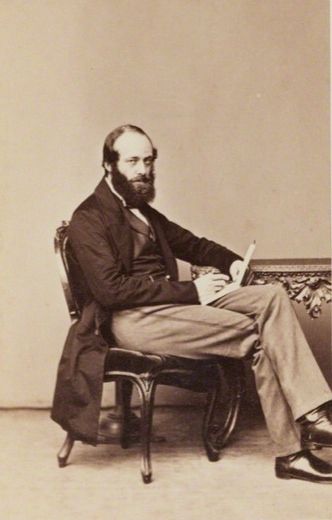
Lord Robert Cecil
Their selection as candidates for Stamford, however, went a good way to illustrating the promise each was seen to possess by their colleagues in the Conservative Party. Whilst one was a reactionary aristocrat and the other a more moderate member of the landed gentry, it was hoped that each man would prove in the coming years to be able to put his talents to good use in restoring the primacy of the Conservative Party (which, arguably, had not existed in its proper sense since before the Reform Act) and the defeat of Palmerstonian politics.
Buckinghamshire
Benjamin Disraeli was also keen to put a spoke in the Palmerstonian wheel as he prepared to face his Whiggish challenger in his constituency of Buckinghamshire. The challenger in question was William Cavendish, son of the Lord Chesham, though otherwise undistinguished. During the campaign the two met to debate only once, at the end of October, when the primary topic of interest was that of that of trade.
For Disraeli, this was an intriguing issue. Whereas he had come to prominence via his spirited denunciations of Peel and his free traders, and despite the fact that his party continued to regard Peel's successors with little aside from hostility, the consensus by the end of the 1850s had seen protectionist policies fall sharply out of favour. Lord Derby's various, nearly always ill-fated attempts at forming protectionist ministries had not given adherents of the doctrine any real good publicity, whilst the strong economic conditions that persisted throughout the period did nothing to dissuade the electorate in their support of the economically liberal parties of Parliament. Disraeli therefore saw that if the Conservative Party was to be saved from irrelevance in the face of an unremitting Whiggish tide, it would have to alter its position on the matter, and surely enough, Derby's support of tariffs had gradually waned to the point of apparently disappearing throughout his lengthy spells in opposition.
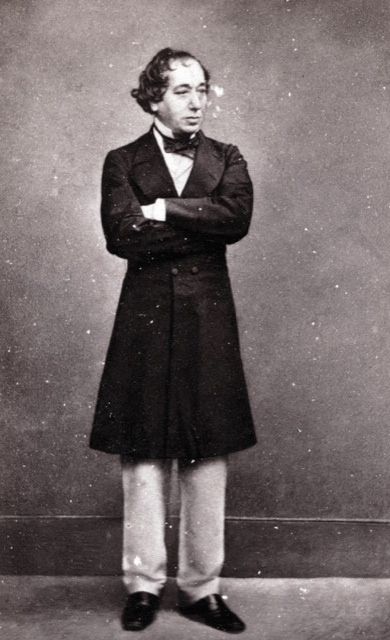
Disraeli c.1860
Happily, back in Disraeli's adoptive home of Beaconsfield, where his debate with Cavendish was staged, this put the Conservative leader in a good position. Now in agreement with his opponent over the matter raised, the only way that differences could be made between the two candidates was via their own personal appeal. Undoubtedly, in this area Disraeli stood leagues ahead of his rival. With his intriguing Jewish manners and infallible quick wit, not to mention his possession of a "home advantage", Disraeli easily saw off an opponent who could offer no riposte to his Tory rival's exoticism. The next day, an enchanted local press announced Disraeli the debate's victor without a second thought.
Oxford University
Whilst Dizzy was busy dazzling his home crowd, Gladstone was preparing to do the same against the latest Tory challenger to his Oxford University seat. The man in question was Sir William Heathcote, one of the largely undistinguished members of the landed gentry to have gradually come to make up the large body of the Conservative Party by the late 1850s. Gladstone had held the seat for ten years by 1857, and so could be justified in his confidence in keeping it for a few more, yet Heathcote had no intentions of giving him an easy journey back to Westminster.
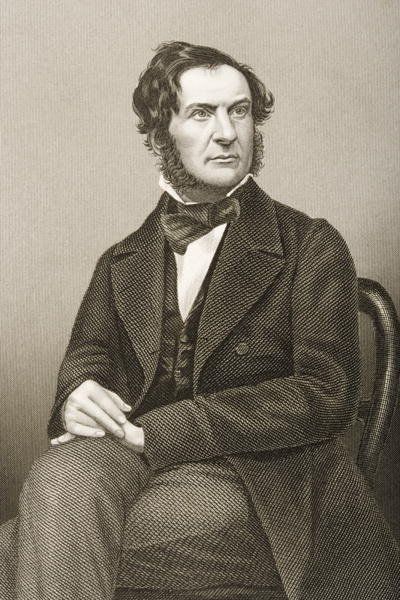
Gladstone in 1860
The main matter discussed when the two men met at the university's Union Society in early November was that of the war. With the electorate of Oxford generally removed from the popular acclaim of Palmerston's gunboat antics, the issue was able to be examined with a far greater level of detachment as was perhaps possible elsewhere. Heathcote was allowed to state his opinions first, delivering a competent (if by no means remarkable) piece of invective against the war's inefficiency and the failings of the sitting ministry to overcome this. As a member of the ministry in question, Gladstone had a vested interest in defending himself and his colleagues, which he did in his trademarked style, offering an account of the hardships of wartime administration that verged on moralising. Yet Gladstone was prevented from delivering the killing blow to his opponent by the fact that he fostered his own doubts about the war's prosecution. Though he had not seen fit to resign over the matter, Gladstone's commitment to keeping government expenses low had seen him develop a cool regard for Palmerston's adventuring, which he viewed merely as another source of strain on the Treasury. He therefore found himself at times in the debate offering little more than thinly-veiled statements of agreement with his opponent, which did little to galvanise the assembled crowd of voters. Naturally, he still possessed his admirable service record and the home advantage, but the debate had proven far from the mere formality Gladstone and his Peelite colleagues had hoped it might. Whilst only whispered quietly, some contemporary commentators writing after the event questioned whether the election would see Gladstone's meteoric ascendancy thrown off-course.
City of London
In the City of London, Lord John Russell had no such worries. Although his status as overall leader of the Whigs had been (arguably unexpectedly) usurped by Palmerston, this had done nothing to dampen his appeal to his constituents, by whom he was viewed as a dedicated and capable reformer. Nor had it done anything to lessen the his stronghold over the City of London, which had seen the Tories completely forced out by 1857 as party leaders decided that resources would be better used elsewhere.
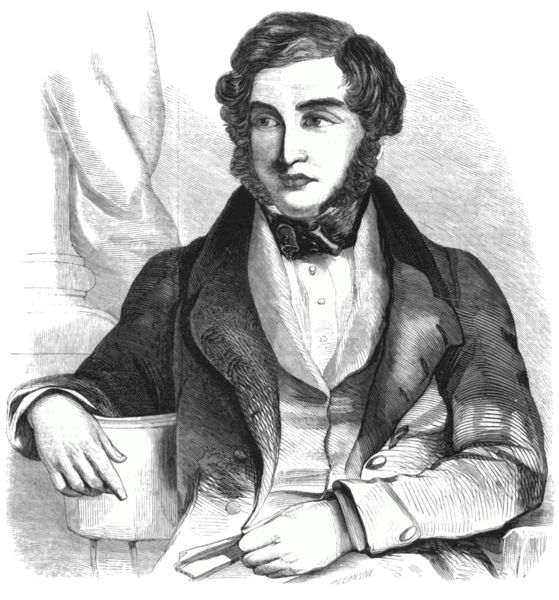
A younger de Rothschild in 1847
As was becoming a theme in the constituency, however, it would not be Russell but rather his colleague, the Baron Rothschild, who would ultimately command the public's attention throughout the election season. Since first having been elected in 1847, the Jewish Rothschild had not once assumed his seat. By 1857, after a decade of fruitless attempts to enter Parliament, the call for Jewish emancipation was becoming a more prominent issue amongst Whiggish reformers[3], whose past attempts to resolve Jewish disabilities had all been quashed by a reluctant Parliament. It was hoped, as it had been hoped at each election, that Rothschild being elected yet again would provide empirical proof of the indifference of the public to having Jewish MPs. Lord John Russell in particular was keen to assume the campaign as one of his own projects, having grown restless during the past ministry as the Canningite Palmerston remained unconvinced about the sort of radical change desired by Russell and his followers. Nevertheless, with war out if the way and Parliament fully able to concentrate on domestic affairs, Russell and Rothschild saw this as their best chance yet of reform.
Birmingham
The final event of any real national interest took place days before polling in Birmingham, where John Bright had hastily been put up as a Radical candidate after it became clear that his opposition to the Masovian War would lose him his seat in Manchester[4]. The people of Birmingham had no such reservations, and his route to Parliament look assured once more. He faced only one challenger in his bid; namely, the Peelite Sir Thomas Dyke Acland. Sir Thomas was a committed free trader of the Gladstonian school (though to contest Birmingham as anything else at the time would have been equitable to not running for Parliament at all) and so in agreement with Bright on many issues. Therefore, in similar circumstances to Disraeli's battle of personalities with William Cavendish the previous month, the contest in Birmingham would be one of a candidate's abilities, not his ideas. In this regard, Bright was without equal. Known as one of the prime orators of his day, he had hones his powers of speech during the Corn Law debates, during which he had vociferously worked towards their repeal. Acland was not similarly gifted. Whilst undoubtedly a competent politician, he was a landowner rather than a demagogue, used to a life of domestic improvement and occasional political service.
Nevertheless, Bright's accession to Westminster was largely seen as guaranteed. Therefore, it fell to Acland to contest the second seat on offer in the city – which, much like the election itself, remained wide open.
Polls and Predictions
(Note that 329 seats are needed for a majority.)
Cambridge Union Society
Whigs - 350
Conservatives - 274
Peelites - 18
Repealers - 12
Radicals - 4
Whig outright victory [majority of 22]
Oxford Union Society
Whigs - 333
Conservatives - 288
Peelites - 18
Repealers - 15
Radicals - 4
Whig outright victory [majority of 5]
The Times
Whigs - 352
Conservatives - 269
Repealers - 17
Peelites - 16
Radicals - 4
Whig outright victory [majority of 24]
The Examiner
Whigs - 368
Conservatives - 260
Radicals - 15
Peelites - 12
Repealers - 3
Whig outright victory [majority of 40]
The News of the World
Conservatives - 331
Whigs - 278
Peelites - 23
Repealers - 21
Radicals - 3
Conservative outright victory [majority of 3]
1: With reference to the fact that it sent two members to Parliament.
2: James Kennedy in 1832. His election was likely buoyed by the post-Reform Act liberal spirit that swept the country.
3: And some Tories, for that matter, inspired by their naturally-Jewish Commons leader.
4: I've had to slightly adjust the last actual update to reflect the fact that Bright would have resigned over the war due to his religion. Somehow, it had completely passed me by at the time. In short, he now resigned in 1854 with Lansdowne and was replaced as President of the Board of Trade by Lord Stanley of Alderbrey.
Last edited:



